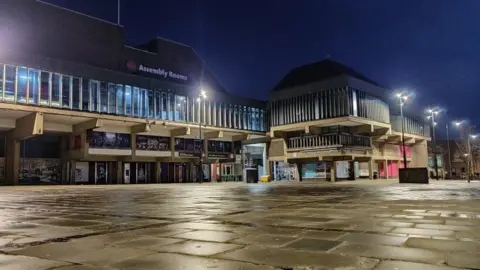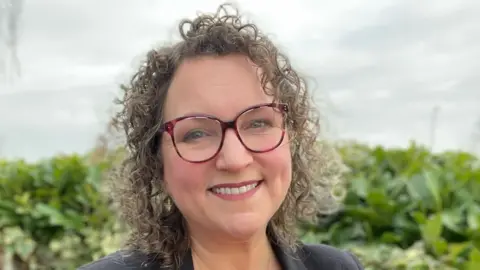Raac safety work under way at Derby's Assembly Rooms
 BBC
BBCWork to ensure Derby's Assembly Rooms "remains safe" is under way after it was confirmed the building contains crumbling concrete.
Derby City Council said it was aware of the extent of Raac (reinforced autoclaved aerated concrete) at the city centre venue.
Plans are currently in place to demolish the building, which has been out of use since a major fire in 2014.
However long-term plans for the site are still undecided.
 Nadine Peatfield
Nadine PeatfieldThe city council was asked to respond after a report in 2020 said that a multimillion-pound plan to refurbish the building would also "require the roof planks made of reinforced autoclaved aerated concrete (Raac) to be completely replaced because of the danger of them failing".
According to the Local Democracy Reporting Service, a local resident asked: "After the fire when the council were talking about demolition the council mentioned that the roof had Raac concrete.
"So why is it still standing and why did the council spend a lot of money on it before the fire if it knew it was unsafe?"
In response, Nadine Peatfield, cabinet member for the city centre, said: "The council has been proactively working to understand the condition and safety of the Assembly Rooms site for some time.
"We are aware of the extent of Raac in the building and works are continuing to ensure the building remains safe.
"The building is earmarked for demolition and the relevant planning consent has been granted.
"Work is under way to bring forward plans for the site, which must be in place before the building is demolished."
Earlier this year, a number of Derby councillors said they wanted the Assembly Rooms to be demolished as soon as possible so that a "meanwhile use" replacement could be organised to help bring in more footfall while long-term plans for the site were decided.
However, campaign organisation the Twentieth Century Society Group - which raises awareness of outstanding UK buildings that are at risk - said the proposed demolition of Assembly Rooms was "needless".

Follow BBC East Midlands on Facebook, Twitter, or Instagram. Send your story ideas to [email protected].
